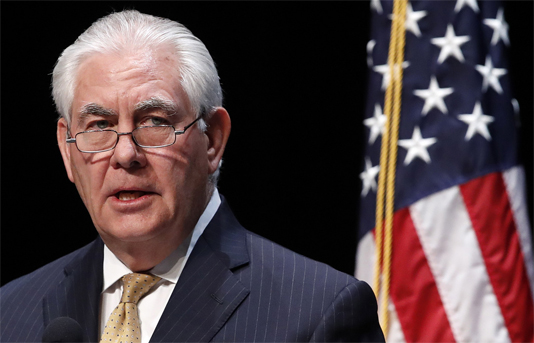MOSCOW, March 14, 2018 (BSS/TASS) – The dismissal of US Secretary of State Rex Tillerson is not connected to the poisoning of former Russian spy Sergey Skripal and his daughter in Salisbury, Russia’s envoy to the European Union Vladimir Chizhov told Euronews TV channel.
“I’m convinced that first, he [Rex Tillerson] was fired as the Secretary of State not due to this episode [Skripal case]. Second, I have no grounds to expect his successor to take a too mild approach,” Chizhov said.
On Tuesday, US President Donald Trump announced that Secretary of State Rex Tillerson had been dismissed and Michael Pompeo, director of the Central Intelligence Agency, would replace him.
Later, Tillerson announced that he would step down on March 31, but would transfer most of his duties to his deputy John Sullivan.
Former Russian military intelligence (GRU) Colonel Sergey Skripal, 66, and his 33-year-old daughter Yulia on March 4 suffered from the effects of a nerve agent. They were found unconscious on a shopping mall bench in Salisbury, southern England. Both are now in hospital in critical condition.
In 2004, Russia’s Federal Security Service (FSB) arrested Skripal and later on, he was sentenced to 13 years in prison for high treason. Six years later, the former colonel was handed over to the US as part of a swap deal involving espionage suspects. Later that same year, Skripal settled down in Britain.
On Monday, UK Prime Minister Theresa May said Russia was “highly likely” responsible for Skripal’s poisoning, calling it a “reckless, indiscriminate and irresponsible” act against the United Kingdom. She claimed that the nerve gas, known as Novichok, had been developed in the Soviet Union.
On Tuesday, Russian Foreign Minister Sergey Lavrov said Moscow had no connection to this case. He also said Russia had not received any request from the United Kingdom on the substance allegedly used in the Salisbury incident.
Under the Chemical Weapons Convention, the UK must have contacted with Russia granting it access to the substance. In line with the document, the suspected party has 10 days to respond to the request.



